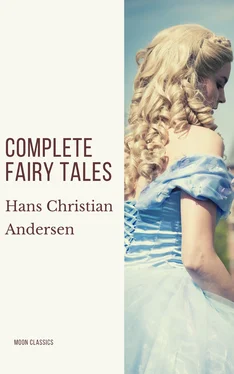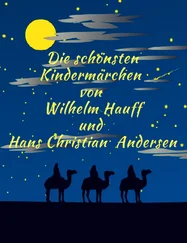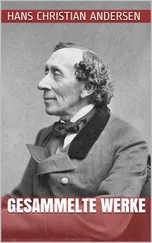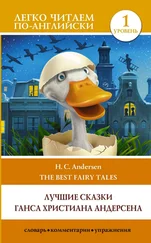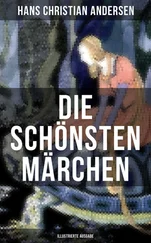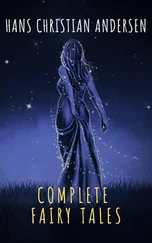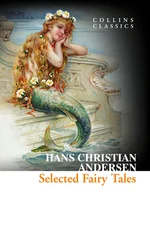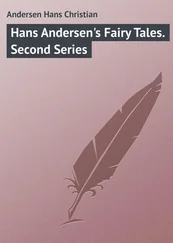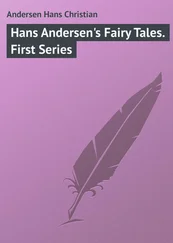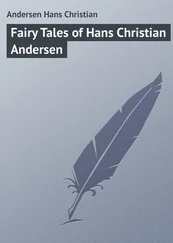Hans Christian - Complete Fairy Tales of Hans Christian Andersen
Здесь есть возможность читать онлайн «Hans Christian - Complete Fairy Tales of Hans Christian Andersen» — ознакомительный отрывок электронной книги совершенно бесплатно, а после прочтения отрывка купить полную версию. В некоторых случаях можно слушать аудио, скачать через торрент в формате fb2 и присутствует краткое содержание. Жанр: unrecognised, на английском языке. Описание произведения, (предисловие) а так же отзывы посетителей доступны на портале библиотеки ЛибКат.
- Название:Complete Fairy Tales of Hans Christian Andersen
- Автор:
- Жанр:
- Год:неизвестен
- ISBN:нет данных
- Рейтинг книги:5 / 5. Голосов: 1
-
Избранное:Добавить в избранное
- Отзывы:
-
Ваша оценка:
- 100
- 1
- 2
- 3
- 4
- 5
Complete Fairy Tales of Hans Christian Andersen: краткое содержание, описание и аннотация
Предлагаем к чтению аннотацию, описание, краткое содержание или предисловие (зависит от того, что написал сам автор книги «Complete Fairy Tales of Hans Christian Andersen»). Если вы не нашли необходимую информацию о книге — напишите в комментариях, мы постараемся отыскать её.
125 of the most famous, classic fairy tales.
Includes The Ugly Duckling, The Toad, The Emperor's New Suit, The Ice Maiden, Thumbelina, The Princess and the Pea, The Snow Queen, and many, many more.
Hans Christian Andersen began publishing his Fairy Tales in 1835. This collection of 127 of the stories was translated by Mrs. Paull
Complete Fairy Tales of Hans Christian Andersen — читать онлайн ознакомительный отрывок
Ниже представлен текст книги, разбитый по страницам. Система сохранения места последней прочитанной страницы, позволяет с удобством читать онлайн бесплатно книгу «Complete Fairy Tales of Hans Christian Andersen», без необходимости каждый раз заново искать на чём Вы остановились. Поставьте закладку, и сможете в любой момент перейти на страницу, на которой закончили чтение.
Интервал:
Закладка:
Out in the garden there was a great festival. Brilliant lamps hung in festoons from tree to tree; and paper lanterns, through which the light shone till they looked like transparent tulips. It was a beautiful evening, and the weather mild and clear. The stars twinkled; and the new moon, in the form of a crescent, was surrounded by the shadowy disc of the whole moon, and looked like a gray globe with a golden rim: it was a beautiful sight for those who had good eyes. The illumination extended even to the most retired of the garden walks, at least not so retired that any one need lose himself there. In the borders were placed bottles, each containing a light, and among them the bottle with which we are acquainted, and whose fate it was, one day, to be only a bottle neck, and to serve as a water-glass to a bird's-cage. Everything here appeared lovely to our bottle, for it was again in the green wood, amid joy and feasting; again it heard music and song, and the noise and murmur of a crowd, especially in that part of the garden where the lamps blazed, and the paper lanterns displayed their brilliant colors. It stood in a distant walk certainly, but a place pleasant for contemplation; and it carried a light; and was at once useful and ornamental. In such an hour it is easy to forget that one has spent twenty years in a loft, and a good thing it is to be able to do so. Close before the bottle passed a single pair, like the bridal pair—the mate and the furrier's daughter—who had so long ago wandered in the wood. It seemed to the bottle as if he were living that time over again. Not only the guests but other people were walking in the garden, who were allowed to witness the splendor and the festivities. Among the latter came an old maid, who seemed to be quite alone in the world. She was thinking, like the bottle, of the green wood, and of a young betrothed pair, who were closely connected with herself; she was thinking of that hour, the happiest of her life, in which she had taken part, when she had herself been one of that betrothed pair; such hours are never to be forgotten, let a maiden be as old as she may. But she did not recognize the bottle, neither did the bottle notice the old maid. And so we often pass each other in the world when we meet, as did these two, even while together in the same town.
The bottle was taken from the garden, and again sent to a wine merchant, where it was once more filled with wine, and sold to an aeronaut, who was to make an ascent in his balloon on the following Sunday. A great crowd assembled to witness the sight; military music had been engaged, and many other preparations made. The bottle saw it all from the basket in which he lay close to a live rabbit. The rabbit was quite excited because he knew that he was to be taken up, and let down again in a parachute. The bottle, however, knew nothing of the "up," or the "down;" he saw only that the balloon was swelling larger and larger till it could swell no more, and began to rise and be restless. Then the ropes which held it were cut through, and the aerial ship rose in the air with the aeronaut and the basket containing the bottle and the rabbit, while the music sounded and all the people shouted "Hurrah."
"This is a wonderful journey up into the air," thought the bottle; "it is a new way of sailing, and here, at least, there is no fear of striking against anything."
Thousands of people gazed at the balloon, and the old maid who was in the garden saw it also; for she stood at the open window of the garret, by which hung the cage containing the linnet, who then had no water-glass, but was obliged to be contented with an old cup. In the window-sill stood a myrtle in a pot, and this had been pushed a little on one side, that it might not fall out; for the old maid was leaning out of the window, that she might see. And she did see distinctly the aeronaut in the balloon, and how he let down the rabbit in the parachute, and then drank to the health of all the spectators in the wine from the bottle. After doing this, he hurled it high into the air. How little she thought that this was the very same bottle which her friend had thrown aloft in her honor, on that happy day of rejoicing, in the green wood, in her youthful days. The bottle had no time to think, when raised so suddenly; and before it was aware, it reached the highest point it had ever attained in its life. Steeples and roofs lay far, far beneath it, and the people looked as tiny as possible. Then it began to descend much more rapidly than the rabbit had done, made somersaults in the air, and felt itself quite young and unfettered, although it was half full of wine. But this did not last long. What a journey it was! All the people could see the bottle; for the sun shone upon it. The balloon was already far away, and very soon the bottle was far away also; for it fell upon a roof, and broke in pieces. But the pieces had got such an impetus in them, that they could not stop themselves. They went jumping and rolling about, till at last they fell into the court-yard, and were broken into still smaller pieces; only the neck of the bottle managed to keep whole, and it was broken off as clean as if it had been cut with a diamond.
"That would make a capital bird's glass," said one of the cellar-men; but none of them had either a bird or a cage, and it was not to be expected they would provide one just because they had found a bottle neck that could be used as a glass. But the old maid who lived in the garret had a bird, and it really might be useful to her; so the bottle neck was provided with a cork, and taken up to her; and, as it often happens in life, the part that had been uppermost was now turned downwards, and it was filled with fresh water. Then they hung it in the cage of the little bird, who sang and twittered more merrily than ever.
"Ah, you have good reason to sing," said the bottle neck, which was looked upon as something very remarkable, because it had been in a balloon; nothing further was known of its history. As it hung there in the bird's-cage, it could hear the noise and murmur of the people in the street below, as well as the conversation of the old maid in the room within. An old friend had just come to visit her, and they talked, not about the bottle neck, but of the myrtle in the window.
"No, you must not spend a dollar for your daughter's bridal bouquet," said the old maid; "you shall have a beautiful little bunch for a nosegay, full of blossoms. Do you see how splendidly the tree has grown? It has been raised from only a little sprig of myrtle that you gave me on the day after my betrothal, and from which I was to make my own bridal bouquet when a year had passed: but that day never came; the eyes were closed which were to have been my light and joy through life. In the depths of the sea my beloved sleeps sweetly; the myrtle has become an old tree, and I am a still older woman. Before the sprig you gave me faded, I took a spray, and planted it in the earth; and now, as you see, it has become a large tree, and a bunch of the blossoms shall at last appear at a wedding festival, in the bouquet of your daughter."
There were tears in the eyes of the old maid, as she spoke of the beloved of her youth, and of their betrothal in the wood. Many thoughts came into her mind; but the thought never came, that quite close to her, in that very window, was a remembrance of those olden times,—the neck of the bottle which had, as it were shouted for joy when the cork flew out with a bang on the betrothal day. But the bottle neck did not recognize the old maid; he had not been listening to what she had related, perhaps because he was thinking so much about her.
Chapter 12 The Buckwheat
VERY often, after a violent thunder-storm, a field of buckwheat appears blackened and singed, as if a flame of fire had passed over it. The country people say that this appearance is caused by lightning; but I will tell you what the sparrow says, and the sparrow heard it from an old willow-tree which grew near a field of buckwheat, and is there still. It is a large venerable tree, though a little crippled by age. The trunk has been split, and out of the crevice grass and brambles grow. The tree bends for-ward slightly, and the branches hang quite down to the ground just like green hair. Corn grows in the surrounding fields, not only rye and barley, but oats,-pretty oats that, when ripe, look like a number of little golden canary-birds sitting on a bough. The corn has a smiling look and the heaviest and richest ears bend their heads low as if in pious humility. Once there was also a field of buckwheat, and this field was exactly opposite to old willow-tree. The buckwheat did not bend like the other grain, but erected its head proudly and stiffly on the stem. "I am as valuable as any other corn," said he, "and I am much handsomer; my flowers are as beautiful as the bloom of the apple blossom, and it is a pleasure to look at us. Do you know of anything prettier than we are, you old willow-tree?"
Читать дальшеИнтервал:
Закладка:
Похожие книги на «Complete Fairy Tales of Hans Christian Andersen»
Представляем Вашему вниманию похожие книги на «Complete Fairy Tales of Hans Christian Andersen» списком для выбора. Мы отобрали схожую по названию и смыслу литературу в надежде предоставить читателям больше вариантов отыскать новые, интересные, ещё непрочитанные произведения.
Обсуждение, отзывы о книге «Complete Fairy Tales of Hans Christian Andersen» и просто собственные мнения читателей. Оставьте ваши комментарии, напишите, что Вы думаете о произведении, его смысле или главных героях. Укажите что конкретно понравилось, а что нет, и почему Вы так считаете.
